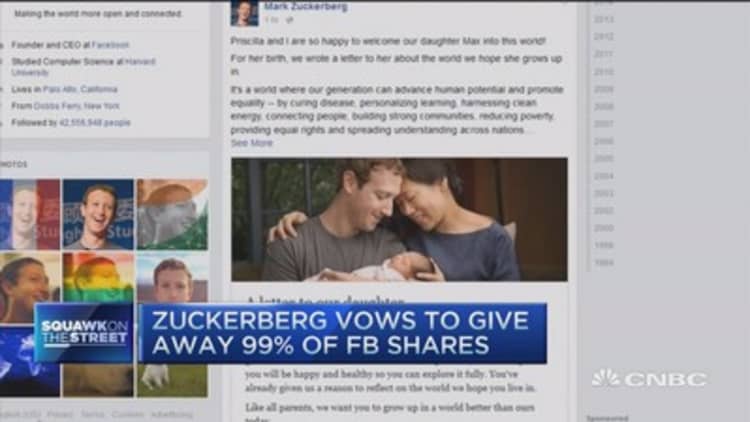
When Priscilla Chan and Mark Zuckerberg announced they would be giving away the bulk of their fortune and searching for impactful ways to make a difference, they didn't just startle the super rich. They also pointed to a new focus on making charity effective, just in time for peak giving season.
Nearly one-third of all charitable giving in 2014 took place in December, including 12 percent in the last three days of the year, according to Network for Good, a provider of fundraising software to nonprofits. But that does not mean those donations create a world of good.
"We are taught charity is a warm, fuzzy thing and that as long as our intentions are good we should be applauded. We are not taught to think rigorously about our approach. We are not taught how to succeed at doing good, or even that success is what matters. So we aren't in the habit of making calculated decisions when it comes to doing good," wrote Nick Cooney, director of education at Mercy for Animals and the author of "How to be Great at Doing Good."
Many people give reactively, when a friend asks for support for a charity they are involved with. Others may receive a compelling request from an organization they know, or a mail or online solicitation. Still others donate to their congregation or other religious institution because they feel a strong connection there.
While these donations are made with heart, they may not be going to organizations that use the money most effectively or tackle the most impactful causes. But donors may have a way to check on even small local organizations' performance.
"Often, the people you know who serve on charity boards might know some things that are the most important," said Stacy Palmer, editor of the Chronicle of Philanthropy. Alternatively, "you can look at their financial information online, and ask them if they are getting results and how they know."
Another option is to look at charity rating sites like Charity Navigator, BBB Wise Giving Alliance, or CharityWatch. These provide easily comparable measures of financial efficiency, like the percentage of money spent on programs, administration and fundraising.
Those measures may not tell all, however. Some experts warn that charities need to invest in things like up-to-date technology and program evaluation to move forward.
Then there is the approach currently gaining traction, which upends traditional notions about giving. Rather than starting from the causes a donor finds most inspiring, proponents of this approach argue for measuring charities on other metrics, and allocating money based solely on where it will have the greatest impact.
GiveWell, one organization aiming for impactful giving, focuses on the global poor, arguing that "low-income people in the developing world have dramatically lower standards of living than low-income people in the U.S., and we believe that a given dollar amount can provide more meaningful benefits when targeting the former."
GiveWell also looks for programs that have been studied for efficacy and whose work could be generalized to others in need. Most of the charities it recommends provide health interventions, like the Deworm the World Initiative led by Evidence Action.
The Open Philanthropy Project, a collaboration between GiveWell and the foundation Good Ventures, has been looking at areas to focus on by asking several questions: what is the problem? how many people does it affect and how deeply? what are possible interventions and who else is working on it? (They expect to have more impact when there are fewer organizations working in the same area.)
Organizations like these "don't care whether they are passionate about a particular cause. They just care whether it is effective, whether they can make a difference," said Palmer.
All well and good, but many donors also want to feel excited about where their money is going. That is especially true when families are trying to teach children about charity and get them excited about giving back.
Palmer suggested that donors consider a mixed approach to both boost their effectiveness and keep them and their families engaged.
"You could reserve 20 percent [of your charity budget] for a cause that maybe you are not that interested in, but you think is really effective and can change the world in some way," she said. "It may not be the kind of thing you get excited about compared to, say, the arts, but look at it as kind of a portfolio."
With world hunger and poverty a persistent problem, environmental challenges abounding, health issues around the world and many cultural organizations struggling, experts argue that making charity dollars work harder makes all the sense in the world.
"It's one thing just to give money or give time," said Thomas Tierney, co-founder and chairman of the nonprofit consultancy The Bridgespan Group, in an online interview. "It's another to give smart in a way that generates the highest social impact for whatever it is you are trying to do."





